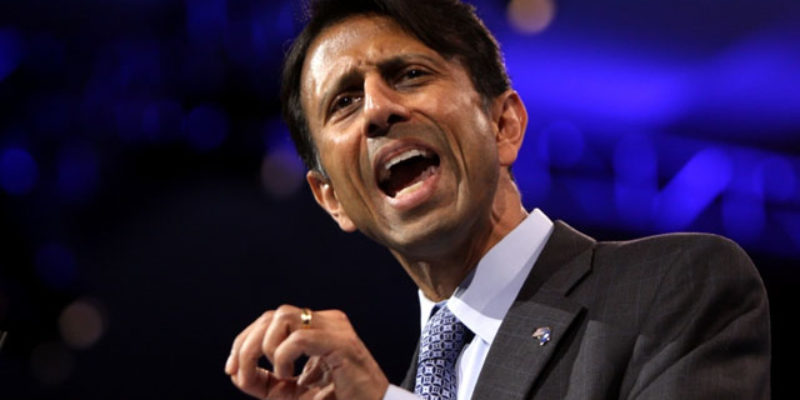As Bobby Jindal prepares to leave office as governor next week, it’s time to take a look back of his 8 years in charge of this state. The reviews will be overwhelmingly negative from the Louisiana media and from probably a vast majority of Louisiana voters. The election of the left-wing lightweight John Bel Edwards governor was as much of a repudiation of Jindal as it was David Vitter.
However, I would argue that in four to eight years we will be missing Bobby Jindal and not just because Edwards is a lightweight. Jindal has done much for the state and for that we should be grateful.
Jeff Sadow wrote about Jindal’s legacy today at The Advocate. Here are some excerpts.
While some denigrate outgoing Gov. Bobby Jindal’s tenure in office, a review of his record reveals many more policy successes than misses.
From the start, Jindal faced the twin revenue challenges of the disaster recovery-stimulated false economy deflating and, a year later, of Democrats taking control in Washington. Those Washington policies led to continuing economic malaise that saps state revenue. As a result, this fiscal year’s budget calls for a billion fewer state dollars spent than in fiscal year 2009.Some of the reduction came from income tax cuts in that first fiscal year that Jindal supported reluctantly. However, those tax cuts also helped stimulate the state’s economy. So, despite the poor economic management of President Barack Obama, Louisiana’s private sector grew after the state tax cuts at a rate faster than the rest of the country’s and inflation. Louisiana also added at a greater rate more private-sector jobs than the country as a whole, even accounting for the oil bust of the past year.
Contrary to manufactured legend, as revenue tightened, Jindal spent more on the two most vulnerable areas in the budget. Spending on health care and higher education combined went up $1 billion, although with the former, increased federal dollars helped. Higher education also benefited from higher tuition and fees. Those increases brought Louisiana from among the lowest amounts charged to students among the states to a little below the middle.
Jindal also embarked on a number of efficiency measures that went largely unnoticed. By transferring Medicaid from a fee-for-service to a managed capitation system, privatizing operation of most state-owned hospitals and matching services to needs, the governor saved Louisiana several hundred million dollars a year in health care costs, which constitute 40 percent of all state spending. Also, on most indicators, the quality of health care has improved as a result.
Besides the realm of fiscal policy, Jindal also excelled in a number of other areas. He made Louisiana a leader in school choice and introduced education accountability measures that advanced children’s interests instead of special interests. He spurred ethics reforms to increase accountability of public servants. He leveraged oil spill recovery dollars to put coastal restoration efforts years ahead of schedule.
I would actually add a few things to this list. Jindal showed he was very good at handling disasters and emergencies such as Hurricane Gustav and the BP oil spill. He also got the state out of making direct cash payments for both the New Orleans Saints and New Orleans Pelicans. Finally, Jindal made Louisiana a more attractive place to do business throughout his administration.
Now Sadow goes on to admit that Jindal screwed the pooch on a lot of things, especially in his second term. For example, Louisiana’s ethics reforms were incomplete at best. Sadow also cites as Jindal failures his inability to cut spending more aggressively, restrain the growth in salaries of state workers compared to the private sector, and failure to reform the state’s retirement system. Sadow also criticizes Jindal for his anti-Common Core crusade saying “he missed the big picture.” I would add to the list the budget debacles of his second term where it was balanced by largely one-time money.
Of course much of this came in his second term where Jindal largely checked out to advance his national political ambitions. There is the perception, with some truth, that Jindal was no longer focused on his job as governor of Louisiana and he was more interested in running for president. Louisiana largely paid the price for that.
But the successes of Jindal’s administration cannot be ignored and most Louisianians will look back fondly on those, especially when they come under attack by the Edwards administration.
Advertisement
Advertisement

